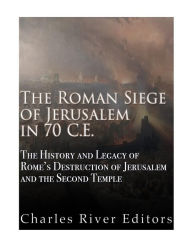The Roman Siege of Jerusalem in 70 CE: The History and Legacy of Rome's Destruction of Jerusalem and the Second Temple Charles
by River Editors
2020-04-19 22:13:03
The Roman Siege of Jerusalem in 70 CE: The History and Legacy of Rome's Destruction of Jerusalem and the Second Temple Charles
by River Editors
2020-04-19 22:13:03
*Includes pictures*Includes ancient accounts of the siege*Includes online resources and a bibliography for further reading*Includes a table of contents[T]hey ran every one through whom they met with, and obstructed the very lanes with their dead bodi...
Read more
*Includes pictures*Includes ancient accounts of the siege*Includes online resources and a bibliography for further reading*Includes a table of contents[T]hey ran every one through whom they met with, and obstructed the very lanes with their dead bodies, and made the whole city run down with blood, to such a degree indeed that the fire of many of the houses was quenched with these men's blood. And truly so it happened, that though the slayers left off at the evening, yet did the fire greatly prevail in the night, and as all was burning, came that eighth day of the month Gorpieus [Elul] upon Jerusalem; a city that had been liable to so many miseries during the siege, that, had it always enjoyed as much happiness from its first foundation, it would certainly have been the envy of the world. Nor did it on any other account so much deserve these sore misfortunes, as by producing such a generation of men as were the occasions of this its overthrow. - JosephusThe Siege of Jerusalem in 70 CE is arguably the most important event in Jewish history. First, it was the central battle in the First Jewish-Roman war. Second, the failure of the siege on the Jewish side resulted in the destruction of the Second Temple of Jerusalem, a disaster that would eventually prove both permanent and catastrophic, since it was never rebuilt. Third, it permanently altered the diaspora of Judaism in the Ancient World. Fourth, because it was indecisive in breaking the power of the Jewish revolt permanently, it was also inconclusive and led to further, inevitable revolts that broke Judean identity completely.The siege of Jerusalem was a classic case of two opposing and incompatible worldviews. It was not the first time the Romans had conquered the capital of the kingdom, nor was it the first time Jerusalem had been sacked by a foreign power. It was unusual for the Romans, however, because it was not the final act that such a conquest generally was. With few exceptions, such as the Carthaginians and the Celts, the Romans had not encountered an opponent who refused to remain defeated. Roman generals and governors found this stubborn resistance unnerving and that may have contributed to an increased cruelty toward the local Jewish population, not that the Romans generally required an excuse to be brutal. However, the Romans were inclined to be tolerant of local religious customs as long as the local population paid lip service to Roman religious domination, such as in the very politically motivated Cult of the Emperor.To the Romans' bewilderment, the Jews were absolutely, adamantly opposed to worshiping any deity above God (in the universal form of Yahweh), or even alongside or beneath God. At this point in their theological history, the Jews had become strict monotheists. Worshiping the Emperor as a deity would imperil their immortal souls. Therefore, they absolutely refused to do this and were willing to die for their faith. The Jewish refusal to tolerate the Cult of the Emperor in their main place of worship was a direct challenge to Roman political power. The Roman refusal to recognize Jewish monotheism was a direct challenge to Jewish theology. The clash of ideologies would result in many casualties. Josephus, a primary source for the revolt, would calculate the death toll at over 1,000,000. The Roman Siege of Jerusalem in 70 CE: The History of the Roman Emperor's Mysterious Luxury Boats chronicles one of the most influential military campaigns of antiquity. Along with pictures of important people, places, and events, you will learn about the siege of Jerusalem like never before, in no time at all.
Less









.jpg)















.jpg)




